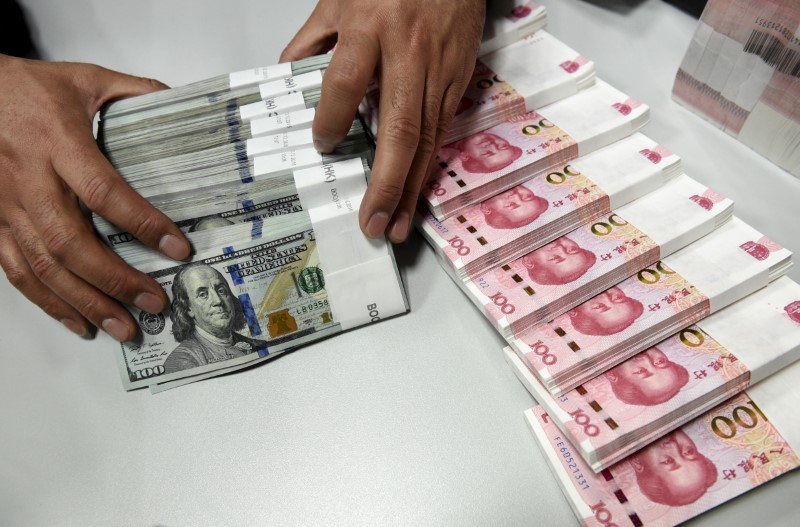By Koh Gui Qing
NEW YORK (Reuters) - As scores of investment bankers profit from the fee bonanza offered by Chinese companies hunting for deals in the United States, one group is conspicuously absent - Chinese banks.
Despite their deep ties with Chinese firms, the country's largest state-owned banks are missing out on the hundreds of millions of dollars that Wall Street banks and their European rivals earn advising Chinese companies on acquisitions and share and debt sales.What is holding the banks back is the way Beijing controls the top lenders to manage the supply of credit to the Chinese economy.
Industrial and Commercial Bank of China (SS:601398) (HK:1398), Bank of China (SS:601988) (HK:3988), Agricultural Bank of China (SS:601288) (HK:1288), and China Construction Bank (SS:601939) (HK:0939) all have China's sovereign wealth fund, China Investment Corp (CIC) (CIC.UL), as the main shareholder.
U.S. rules require the controlling shareholder - or CIC in this instance - to seek Federal Reserve clearance for investment banking operations. This poses a big hurdle to Chinese banks as they would need to coordinate their applications despite having separate managements and strategies, said a banker with a Chinese lender in New York. He declined to be named due to sensitivity of the matter.
The setup means the four banks are only as strong as their weakest link and two of them come with significant baggage, having drawn Fed scrutiny over enforcement of anti-money laundering laws.
The Federal Reserve declined to comment and the CIC and the "big four" banks were not immediately available for comment.
"We've hit a bottleneck," said another banker at a Chinese lender in New York. "As a commercial bank, we've done all we are meant to do. Why don't we become an investment bank ourselves?"
Without changes that would allow Chinese banks to act independently, or an agreement with the Fed to make an exception for them, those keen to expand in the United States will be in a limbo, that banker said.
Lending titans at home, the "big four" have invested in boosting their profile in New York. Industrial and Commercial Bank of China, for example, has an office in Trump Tower on Fifth Avenue, while Bank of China occupies a new mid-town Manhattan office tower it bought in 2014. They take deposits from savers and businesses and provide trade financing and foreign exchange trading services. Between December 2010 and September 2016, their assets in the United States soared over seven times to $126.5 billion (£98.54 billion), Fed data showed.
Beijing so far has given no indication it is ready to relax its grip for the sake of overseas growth, even though some say state divestiture is the ultimate solution.
"The leadership of China faces a choice. They control those institutions for their domestic purposes and I think that limits their ability to go international," said David Dollar, a senior fellow in the John L. Thornton China Center at the Brookings Institution.
"If those big banks really want to go international, I think China has to privatise them," he said.
The stakes are high.
Last year, Chinese companies raised over $22 billion in U.S. debt and stock markets, up 28 percent from 2010 and 12 percent higher than in 2015. The value of mergers and acquisitions involving Chinese firms soared to almost $27 billion last year from a previous high of $3.6 billion reached in 2013. (Graphic: http://tmsnrt.rs/2oyhl3r)
To get a slice of that investment banking business, any foreign institution needs the Fed's recognition as a "financial holding company" that is "well capitalised" and "well managed," according to the Fed's website.
"ALARMING" TRANSACTIONS
That poses a challenge for all four because the Fed took enforcement action against China Construction Bank in 2015 and Agricultural Bank of China last year for not doing enough to fight money laundering, according to the Fed's website.
The central bank did not detail the banks' problems. But when New York's financial regulator in November fined Agricultural Bank of China $215 million for violating anti-money laundering rules, it cited "alarming" transactions including "unusually" large payments from Yemen to the southern Chinese province of Zhejiang.
Public records showed the Fed has not raised similar concerns about the Industrial and Commercial Bank of China and Bank of China so far.
A person familiar with the Fed's thinking said the regulators believed Chinese banks should focus on tightening their procedures before expanding their U.S. businesses.
The person, who declined to be named due to the sensitivity of the matter, said the Fed would never grant the "financial holding company" status to any bank with unresolved regulatory issues.
Chinese banks have argued, without success, against being treated as one entity, the banker and the source familiar with the Fed's thinking said.
Now, bankers in New York plan to analyse the costs and risks of expanding into investment banking and present the findings to their respective boards in China, the banker said.
If the banks' headquarters in Beijing find the business worth pursuing they will conduct their own due diligence and start consulting various Chinese regulators on ways to overcome the regulatory hurdles, the banker said. Despite the challenges, the "big four" clearly has investment banking ambitions. All four have investment banking arms in Hong Kong or mainland China that target Asian deals. U.S. expansion would be the logical next step given that Chinese companies will continue investing overseas in search of growth opportunities and new technology, the banker said.
"Should Chinese banks continue to miss out on this opportunity? That's the question we should ask," said the banker.
